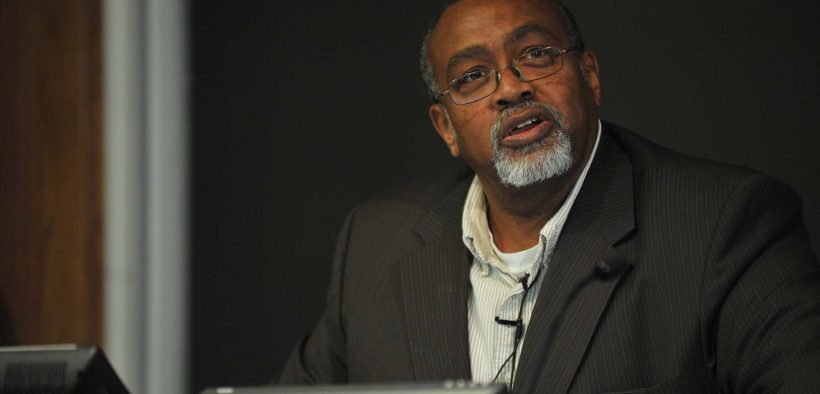A Black Economist Goes Right, Left, and Back Again
Share

The genre of “race memoir” is a dull and barren one, but Glenn Loury has transcended it to produce a great book. The difference is that most authors of race memoirs have not yet done enough interesting things with their lives to make a memoir worth reading—Ta-Nehisi Coates, Afua Hirsch, or, ahem, the up-to-then unaccomplished author of Dreams from My Father. Loury has smoked crack and taught at Harvard, sometimes on the same day, and that is only one snapshot from his singular life.
Glenn Loury was raised on the South Side of Chicago by a single mother and an array of colorful relatives. His uncle Adlert was a lawyer—rare for a black man born in the 1920s—who eventually drank himself to death after being disbarred for a shady business scheme. His other uncle, Alfred, fathered 22 children by four different mothers. Glenn’s parents divorced soon after his mother gave birth to a daughter who was clearly not her husband’s child, although Everett Loury always insisted on treating the girl as his own even after the divorce. This steadfastness was not replicated by Glenn when he became a teenage father; he abandoned his pregnant girlfriend and did not lay eyes on his eldest son until the latter was a grown man.
Loury’s precocious intellect was recognized early when his elementary school teachers recommended him for the University of Chicago’s famous Laboratory School. Strangely, his parents chose to withdraw from the application process. They feared that going to a mostly white selective school would “transform me into someone they would no longer recognize.” This meant that Loury’s path to an academic career took longer than it might have otherwise. An abortive first try at college ended in his dropping out, and he later made it to Northwestern only as a community college transfer student.
On the other hand, avoiding the selective school in Hyde Park and going to a public school on the South Side meant that success, when it came, would not sever Loury’s connection to his roots. He would not be one of those black leaders who had to cultivate an image of authenticity to make up for their alienation from the community, a category that, in Loury’s opinion, includes Barack Obama. “If you took his Kenyan father (who he never really knew) out of the equation, I could see nothing of the African American experience in his life,” he writes.
Loury chose to get his economics PhD at MIT because he thought the many Jewish superstars on its faculty would sympathize with his dilemmas as a minority and hold him to the same standard as everyone else, respecting his desire to be “an outstanding economist-who-happened-to-be-black.” Race could not be entirely excised from his career, however, and after a rapid ascent he was granted tenure at Harvard at age 33, before he was quite mature enough to handle it. The stress of being elevated too fast was one reason he fell into drug use and other criminal behavior in the 1980s. After he was arrested for assaulting his 23-year-old mistress, he spun out and was eventually institutionalized for addiction and spent time in a halfway house before giving up most of his vices in the 1990s, apart from philandering.
Alongside this tumultuous personal journey, Late Admissions also describes Loury’s intellectual journey, which has been no less lively. He started out as a neoconservative during that movement’s heyday in domestic policy, the era of Irving Kristol and the Public Interest, before veering to the left in the 1990s when his research took on the issue of criminal justice reform. After Obama was elected, he veered back to the right.
The book describes in rare detail exactly how social pressure works in enforcing ideological conformity among black intellectuals. In 1984, Loury gave a black female economist at MIT a draft copy of an essay he was working on for the New Republic; alarmed by its conservative thesis (essentially that black progress was being held back more by social pathologies than white racism), she arranged for Loury to attend a private meeting of civil rights leaders and read his paper to them; when he did so, Coretta Scott King, sitting in the front row, burst into tears. “There is no word that could describe my emotions as I watch Coretta Scott King cry,” he writes. Obviously the situation had been deliberately contrived.
Later, in 1999, when he delivered a conference paper rejecting colorblindness, a black economist from Howard University shouted from the audience, “Welcome home, Glenn!” He reflects, “I didn’t mind hearing that. Not at all.” Only Loury’s inborn contrariness allowed him to reject the psychological comforts of being allowed back into the fold and to stake out the place he currently occupies—a public commentator sympathetic to the right, including Donald Trump, but loyal to neither party.
Defenders of campus free speech should read Loury’s memoir for a more compelling defense of their position than is usually offered. Most defenses of academic free speech are based on some Millian ideal of open discussion. Not so for Loury. For him, it is about honor. Being able to defend your position or attack someone else’s is what allows an academic to hold his head high. One of the many things Loury apologizes for in his memoir is an obituary he wrote of James Q. Wilson that attacked him as a racist, despite the fact that Wilson had always been personally kind to him at Harvard. He had savaged friends in print before, as in his review of Abigail and Stephan Thernstrom’s America in Black and White in 1997, and he felt no qualms about that. The difference was that Abby Thernstrom “was more than capable of defending herself. Jim Wilson was dead; he couldn’t speak up for himself.”
In the first chapter, Loury describes snooping around his father’s bachelor apartment and finding “the most organized sock drawer that has ever existed, with brown socks to one side, then white, then black, then navy, all of them folded in uniform fashion, nestled like eggs in a carton.” This neatness was remarkable because nobody, apart from his children and his girlfriend, ever visited the apartment. “My father’s rigorous arrangement of his most intimate possessions is not done for show or in case someone checks or because his wife insists on it. His sense of order, his discipline, goes all the way down.”
“To explain how important my sense of honor is to me, would require introducing them to my father, and telling them my entire life story,” Loury writes. That is what he has done in this book. The same self-discipline and self-respect that produced that sock drawer inspired Loury to live up to his obligation as an academic to speak his mind no matter how unpopular it makes him. It is this emphasis on character, not an abstract commitment to free speech, that makes dissent possible.
Continue Reading at The American Conservative.













